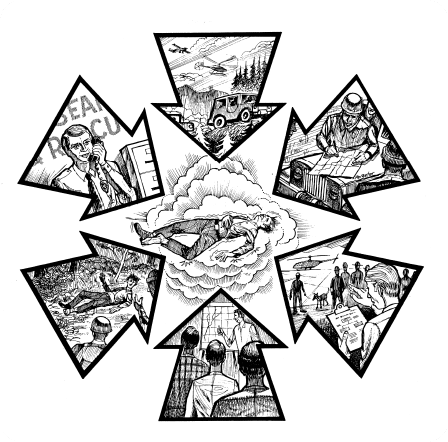TRAINING COURSES
1. Search Management Systems, A Practical Approach to Initiating and Directing Efforts to Resolve Missing Person Reports.
Search Management Systems (SMS) workshops are designed to provide participants with practical and experienced-based proficiencies and tools to help them confidently identify and implement actions and decisions supporting positive incident resolutions. Each workshop is specifically tailored to the audience, with length normally ranging from 8 hours to 32 hours.
The workshops especially focus on the initial response phase, as proper actions implemented early and properly increase the potential for quick resolution and establish a solid decision framework should the search expand to an extended response.
The courses optimize learning by integrating tabletop case studies and field exercises with lectures.
Workshop Objectives:
Who Can Benefit
Law enforcement officers, SAR team leaders, and members, park rangers, land managers, fire and emergency services personnel, leaders of outdoor adventure groups, agency administrators, others responsible for initiating or implementing search actions for missing persons, or anyone concerned with what to do when faced with a missing person report.
Instructor
Hugh Dougher, primary author of the SMS curriculum, has more than four decades of SAR experience as a National Park Service ranger (now retired) and SAR volunteer in a variety of SAR specialties. He has instructed across the US, and in Canada, UK, Middle East, Caribbean, and Asia, served as Incident Commander and Plans Section Chief on several Federal Type I all-hazard incident management teams, is a disaster search instructor of FEMA courses for Texas A&M University, and has authored and contributed to SAR manuals and published papers.
For More Information Contact:
Hugh Dougher
Phone: (360) 630-6764
Email: hughdougher@hotmail.com
2. Additional Training Courses.
Additional training courses include: Initial Attack, 6-step Process (Wilderness); Initial Attack, 6-step Process (Urban); SAR Management; SAR Leadership; Basic SAR Skills; Disaster Assistance Response Training. ERII has access to a national and international instructor network. We are happy to discuss your training needs and solutions.

SEARCH AND RESCUE SERVICES
1. SEARCH AND RESCUE PROGRAM REVIEW: CAPABILITY ASSESSMENT FOR READINESS (SAR-CAR)
The purpose of maintaining a search and rescue program is to ensure that the capability exists to respond effectively to a broad array of potential search and rescue missions.
Assessment results serve as a strategy to guide efforts to develop and maintain a comprehensive search and rescue program.
The Capability Assessment for Readiness (SAR-CAR) is designed to capture the current status of a SAR organization and/or a local or state government's search and rescue readiness. “Proofs” of a viable search and rescue program are found within CAR.
SAR-CAR organizes search and rescue capabilities into 13 SAR-CAR Functions:
A number of objectives can be identified and achieved during a search and rescue (SAR) program assessment including, but not limited to:
a. A valid examination of the search and rescue organization(s) and search and rescue capabilities.
b. The establishment of baseline information pertaining to search and rescue.
c. Increased awareness and collaborative dialogue among local and state search and rescue organizations, and state government’s search and rescue program elements and stakeholders.
d. An examination of the goals, objectives, and the mission of the local and state search and rescue organizations, and the state government’s search and rescue program.
e. Development of action plans and strategic initiatives to maintain or improve the local and state search and rescue organizations, and state government’s search and rescue capability.
This assessment is designed to focus on the identification of program and capability deficiencies (gaps) and will serve as a basis for corrective actions that need to be taken in order to strengthen the local and state SAR organizations, and state government’s search and rescue program. Assessment results will be used to analyze program performance, identify gaps in capability, and to develop a strategic plan to establish priorities for making improvements in the search and rescue program.
